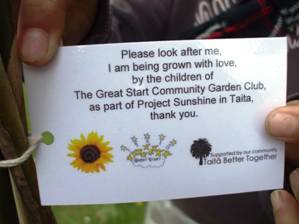Building Community, Helping the Honey Bees With ‘Project Sunshine’
 Taita, New Zealand
Taita, New Zealand
Theme: Building Community
The Story: Having fun can be a great way of learning. Not only that but it can also be a really effective way to build connections to the environment and people around us. In Taita, children have been having fun planting sunflowers in less than beautiful spaces – on verges, along fences and in parks as well as back and front yards. Not surprisingly the sunflowers have been noticed by many people.
So while the children have been learning a lot about the importance of bees and what they can do to protect bee populations, they have also been learning how they can use sunflowers to help not only bees but also their community through ‘Project Sunshine’.
Project Sunshine was designed by the Great Start Taita children’s gardening club. This club came about as a spin-off from a free earth-based holiday programme that was run in spring 2010. The prerequisite for participation in the holiday programme was that each child brought along a parent or big helper so connections with local families and wider whanau were initiated too. The Great Start garden was already established but had some new life breathed into it by working with the ideas and designs of these children and parents who came up with many innovative ways of growing food other than in straight lines. Pumpkins, for example, were grown up trees, beans become tunnels and mosaic paths and decoration using broken old plates were created. As well, a huge circular gifting garden in the design of a sun ray was planted so the children could grow and then give away their produce to others in the community.
The 25 or so children involved in the gardening club have their ideas nurtured and supported by Great Start as much as possible and this led to the idea of giving and receiving quickly growing into the Bright Spot Campaign – a campaign to create beautiful spaces and plantings in the local community. Hundreds of sunflower seedlings were planted through the streets and backyards of Taita by the children and their adult helpers to make their community more beautiful. Attached to these living works of art was a small note to let the community know that the sunflowers were a gift from local children.
And with the planting of the sunflowers, something magical happened: the sunflowers generated pride and joy in the children, and in the wider community.
A local Dad joined in by growing almost two hundred sunflowers along the back of his property for the train commuters to enjoy as they went past. Residents who had the sunflowers planted outside their homes had a reason to chat to each other over the fence and some families added other flowers to their plots and encouraged their own children to water and look after them. The lessons in caring and nurturing along the street became more and more obvious to everyone that walked up and down. Not only did the plantings not get vandalised, as had been predicted, but the project also supported residents to build connections with each other and with their physical environment.
Connections have also been built with a local beekeeper, Al Kilminster who is keen to work with the Taita community in establishing a local beekeeping group. Working with Al, the children learned about the importance of bees, and their current plight. They also realised that sunflower planting could help other children to make their communities beautiful, build connections between people and also ensure the survival of the bee population. So another connection was made with a heritage seed company, Eco Seeds (who supply non-hybrid sunflower seeds for Project Sunshine which means these seeds are fertile and can be harvested to use again the following year) because this season (2011) the Bright Spot campaign has turned into Project Sunshine and it is going national! To do that the gardening club kids need a lot more seeds than those they have harvested from their own sunflowers.
We wanted to support our local community so we chose to use Eco Seeds. The owner, Dave Treadwell, is committed to creating, teaching and supporting organic growing methods and has worked wih many communities throughout the region.
The national Project Sunshine launch on July 2 2011 saw Taita garden club children joined by young people from all over New Zealand. These young New Zealanders were all participating in the 2011 United Nations Youth Model United Nations outreach programme, which is designed to promote the delegates as global citizens, encouraging them to give back to the community and to become involved to begin making changes.
This is exactly what Project Sunshine facilitates too. Project Sunshine’s aim is to facilitate children’s desire to live in beautiful spaces where a oneness between humans and the living world is recognised and is a gift from the children of Taita to all children of Aotearoa New Zealand. The project started this off by giving all the UN youth delegates a ‘Project Sunshine Pack’ containing contain information about the initiative, facts on bees and sunflowers, a guide to growing a project in your own community, an invitation to feed back and stay connected, and 2 packets of sunflower seeds – one packet supplied by Eco Seeds, the other were second generation seeds harvested from the Great Start Children’s Garden Club’s own sunflowers. Each pack that goes out around NZ will contain our very first harvested seeds and the hope is that every community that takes up the Project will in turn share their seeds. The use of open pollinated, organic seed is particularly important to Project Sunshine because this ensures that the sunflower ecocycle can continue and evolve naturally, without the inclusion of artificially modified seed. This means our sunflower seeds can be shared and passed on as they have done for hundreds of years without needing to replace or purchase seed each season.
Open pollination also references the hopes Project Sunshine has for other communities: the idea is for a local leader to bring Project Sunshine to the attention of a local school, community group, sports club or neighbourhood group and work with their children, to support them in their ideas for mass plantings of sunflowers in their community. Not only to beautify, but also to highlight the plight of bee colonies in NZ and to foster stronger environmental and community connections and to have fun! How this happens with be different in different communities but it is the adult and organisational role to support and encourage the children’s efforts, as they develop their leadership qualities and bring about both environmental and community transformation through the simple act of planting and growing, working together and having fun.
In this way, Project Sunshine also illustrates the beginnings of transformational community change. While planting sunflowers may be a simple act, it takes people to make it happen.
Key people have been supported to bring Project Sunshine to life in Taita through Great Start. These people and this support is since been coupled with an increase in community participation and connection that has led to a greater sense of control over the beautification of the physical environment as well greater understandings of environmental and community interconnections both within and beyond Taita. In this way, Project Sunshine can be understood as working across the four dimensions of transformational change. These quadrants of change: personal, relational, structural and cultural are discussed in relation to peace-building by Lederach and colleagues (2007) and illustrated below.

Project Sunshine supports and allows the personal value sets of the children to shine through and to lead the project. This support and these values have worked together to establish, renew and recreate relational ties and connections on a range of levels leading to a shift in the culture of the local community with regard to how children can be involved in Taita and how their efforts are respected and cared for. This is contributing to a growing culture of inclusion of all kinds of people within the community and even beginning to challenge assumed structures and systems in wider society. Simply by taking control of small plots of land that are not privately owned or maintained, communities can demonstrate their power in co-creating an environment with nature for themselves.
So now Project Sunshine is growing community in streets and back yards far from Taita, by inviting Aotearoa children to become leaders in their communities, and encouraging the adults around them to support them to blaze trails of brightness throughout neighbourhoods. It is hoped that by sharing the ideas behind Project Sunshine that other communities will also experience the simple but profound change that the Taita community experienced by supporting children to lead and to take pride and make a visible difference in their community, while having fun. In Taita, the children learnt a lot and the adults did too, and the learning and connecting continues as the group extends their ideas most weeks when they meet to work in the gardens near the Great Start house.
Thanks to the following environmentally responsible businesses for supporting Happyzine:
 ECOtanka
ECOtanka
- Eco-friendly – Reusable for years upon years
- Safe & non-leaching – BPA free (bisphenol-A)
- Solid food-grade stainless steel – Super hygienic & clean
www.ecotanka.com
.
Key learnings
- Transforming community can start small, and doesn’t have to be expensive. Extending an idea that is already working well (gardening and the garden club) to other spaces gets the idea noticed and shows others that a little effort can make a big difference.
- Sometimes all it takes is one person and their passion to get things rolling. Notice the people and their passions around you and invest in those.
- Allow all kinds of people, including children to contribute and to lead. We all have our own talents, abilities and perspectives and bringing them together in a shared project strengthens that project in terms of relevance, resilience and fun!
- Most activities provide opportunities for multiple learnings and outcomes, and often these are different to different people involved. Creating ways to understanding these multiple learnings helps us to design what comes next in ways that can involve and benefit even more people.
- By challenging the unexamined assumptions that we hold (regarding vandalism and communities not caring for example) and by giving children support to follow up their ideas, the Taita children were able to take a leadership role in showing how Taita is and can be beautiful.
Key outcomes
- A stronger connection to nature and specific knowledge about sunflowers and bees for Taita children.
- A more beautiful place for everyone in Taita to live in.
- Sustenance for bees.
- Growing leadership, generosity and pride amongst the children and wider community.
- Stronger community connections between the children and key supporters, including businesses and residents.
- More children have joined in…Gardening Club is now considered cool! We have 25 children involved regularly now, and the new challenge will is to manage the numbers that want to join J.
- Creating ways of sharing and further growing this idea with others, not only in Taita but across Aotearoa New Zealand and beyond!
Contact details
Julia Milne
www.facebook.com/#!/pages/Project-Sunshine-Aotearoa/177935535598813
phone 04 567 5437 or 567 KIDS
loading...
loading...
Tags: Children, Gardening, honey bees, tamariki



This is one amazing article, I’m really pleased to be sharing it with you Happyziners! What a find! Thanks Great Start Taita!
loading...
loading...
Lovely idea and I’m keen to help develop it here in Golden Bay. Bring more flowers and more bees
loading...
loading...